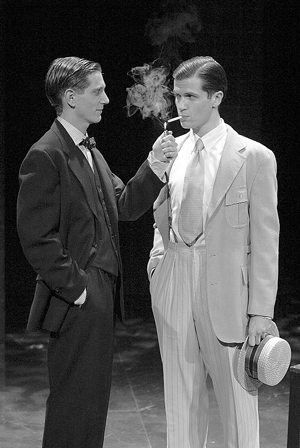A new musical explores the murderous bond of young lovers Leopold and Loeb
Ever had a hopeless crush on somebody? Nineteen-year-old Nathan Leopold had the ultimate crush. He took his love for the 18-year-old Richard Loeb to such an extreme length that he was rewarded with “life plus 99 years.”
In “Thrill Me,” the new musical drama of these star-crossed murderers, even that life sentence does not faze Leopold, who has the final laugh as he trills from his cell that his romantic dream has been realized. If he had his druthers, he would have preferred life imprisonment with his lover-accomplice. “We can spend our lives together in a cage like two rare birds/ the real reason for the murder was for me to have you all to myself,” croons Leopold, played by Matt Bauer.
The real-life Leopold, a brilliant law student whose 1924 murder trial defense counsel was Clarence Darrow, would later write that “Loeb’s friendship was necessary to me—terribly necessary” and that his motive, “to the extent that I had one, was to please Dick.”
Eighty-one years have passed since 14-year-old Bobby Frank was brutally murdered by a malicious duo intent on committing the perfect crime. In the intervening decades, there have been many murder cases the tabloids, and later 24-hour cable, have used to titillate the public—the Lindbergh baby, and more recently the serial killers John Wayne Gacy, cannibalistic Jeffrey Dahmer, suave Ted Bundy and then O.J. Simpson and Scott Peterson, to name a few.
Somehow, though, Leopold and Loeb’s single wicked work stands out through the years. Every murder has a motive, but killing for kicks was something new that horrified Americans in the 1920s. Leopold explained his role in the homicide by saying simply, “I went along with Richard.”
If these educated, promising young men, University of Chicago graduate students, versed in Nietzsche, could commit such savagery, what prevented the rest of us from falling into a similar trap? After all, their inner motive seemed to be the one thing that music of the 1920s was all about—love. Perhaps only the French—with their special penal code category crimes de passion—can understand such tortured romance. The rest of the world, though, is content to watch along in fascination.
The boys’ murderous caper was manna in the desert for an American media eager for a journalistic rampage that would soon sink to new depths in deplorable coverage and treatment of its subjects, hounding such heroes as Charles Lindbergh into exile and mental despair. The Leopold and Loeb case had lots going for it—murder by members of the upper class who were defended by the famous “monkey trial” lawyer, along with topics never before fully aired in public—homosexuality and pedophilia.
Darrow’s powerful oration against the death penalty painted the issue of capital punishment as a moral dilemma. Add to this the public’s distaste for educated people who think they are better than the rest of us and don’t have to follow the rules laid down for the common man. A foretaste of Enron, no less.
Their history has been told in books and recounted three times on film. The first cinematic interpretation, “The Rope” in 1948, featured James Stewart and Farley Granger, in a tale inspired by Leopold and Loeb, but with a different storyline. Eleven years later, Orson Welles, starred in “Compulsion,” a more powerful and factually accurate treatment of the story, which featured Dean Stockwell and Bradford Dillman. In 1992, writer and director Tom Kalin revisited the story in the black-and-white art house hit, “Swoon.” As masterful as these productions were, an element was lacking in bringing the tale’s dark power and intensity to a suitable dramatic climax.
Composer-lyricist and book writer Stephen Dolginoff has given us a gem in the form of “Thrill Me: The Leopold and Loeb Story.” While it is still a diamond in the rough, as are most works in their early stages of development, “Thrill Me” has the potential to evolve into one of the most compelling musicals to come our way in years.
The intimate space of the York Theater provides an up-close and personal setting for this appropriately stark, no-frills production that is animated, without intermission, for an hour and a half by two actors and several off-stage voices. Matt Bauer (Nathan) and Doug Kreeger (Richard) both give outstanding performances. It is rare to find dramatic intensity and musical virtuosity combined to such a degree and sustained without let-up for the duration of the whole performance. These young talents do it.
However, their similarity in voice pitch and timber—they are both fine tenors—is not the ideal combination for heightened drama in this two-person mano-a-mano. A darker baritone Richard, foiled by a tenor Nathan, would have been better, especially in their duets, which often melted into a one-voice sound.
An especially appreciated and innovative feature was the smooth staging that built momentum and heightened tension. By not allowing even the slightest pause where disruptive applause might creep in, this very tightly-paced work was able to keep the audience on the edge of their seats until the lights went on and the smoke machine ceased spewing its atmospheric fog.
Then, the applause was thunderous—the well-deserved appreciation of a full house.
gaycitynews.com



































